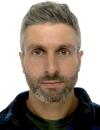Dr Chris Mackie
Associate Tutor

- Moray House School of Education and Sport
- Outdoor and Environmental Education
Contact details
- Email: chris.mackie@ed.ac.uk
Address
- Street
-
Moray House School of Education and Sport, IETL
- City
- University of Edinburgh (Holyrood Campus)
- Post code
- EH8 8AQ
Background
Background
Chris Mackie is an associate tutor in the Outdoor and Environmental Education Section of the Moray House School of Education and Sport.
Chris grew up around residential outdoor centres in the Highlands, and following an undergraduate degree in fine art the MSc in OESE, has worked across outdoor learning as a practitioner in community settings, a research assistant, and a lecturer with the University of the Highlands and Islands.
He also undertook his PhD at Moray House, supported by NatureScot’s Magnus Magnusson Studentship, awarded in memory of the founder chairperson of Scottish Natural Heritage. His doctoral research investigated the emergent processes of outdoor learning during the first years of school in Scotland, and how this might come to affect human-nature relations.
Chris works part-time across our taught postgraduate programmes. He has experience working in regenerative agriculture amongst a range of other things, but now spends most of his time working on knowledge exchange at the Cairngorms National Park Authority.
Qualifications
- PhD (University of Edinburgh, 2023)
- MSc (University of Edinburgh, 2015)
- BA (Hons) (Edinburgh College of Art, 2009)
Responsibilities & affiliations
Fellow of the Higher Education Academy
Postgraduate teaching
PgCert/PgDip/MSc Outdoor Education & PgCert/PgDip/MScMSc Outdoor and Environmental Education
• Course organiser for Education for Environmental Citizenship • Associate Tutor for Interpreting the Landscape and Ecology & Field Studies • Associate Tutor for Dissertation (OE & OESE)
Research summary
Research Summary.
Chris’s PhD research concentrated on the everyday processes of early childhood outdoor learning in school grounds. Rather just focus on the human interactions and meanings that emerged between teachers and children, the study aimed to include the non-human things, beings and matter that were involved too. This meant using video and multimodal observations, which were then read alongside and through policies, practice guidance and other research to create interference patterns around specific topics. This process showed that the children in the study related to lots of different, sometimes conflicting forms of nature through direct and indirect experiences and communication between teachers, children and non-humans.
Processes including attending to things together, collecting and play were identified as important, but the findings also show that human-nature relations can be incoherent across socio-cultural and ecological contexts in schools, which may limit the potential for meaningful learning for sustainability. While practice guidance in Scotland appears to support ways of learning outdoors which could have positive impacts on human-nature relations in early childhood, capacity for this potential to emerge in schools is currently limited by things such as class sizes, staff ratios and school design.
Alongside childhood-nature and healthier human-nature relations, Chris has long-standing research interests in adventure sports, Gaelic ontologies and place-based learning.
